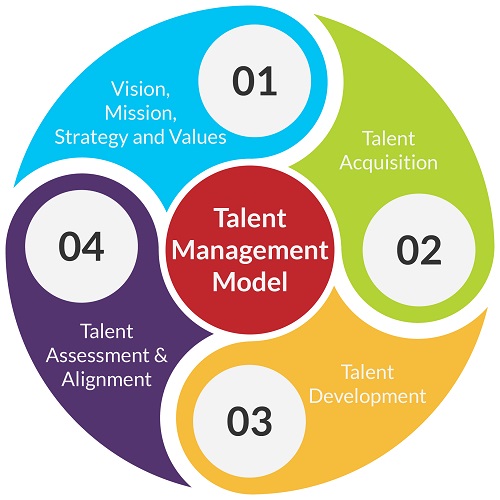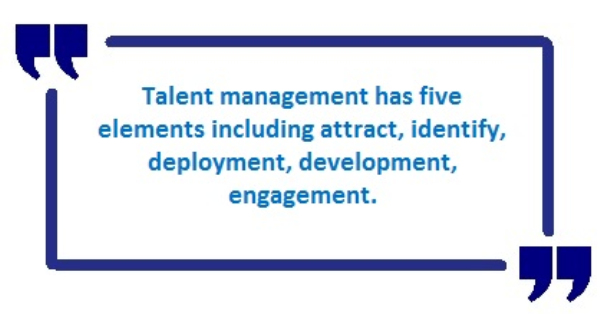The Art of Talent Management
By Besty Taylor

HR在大多数人的概念中主要负责公司人才招聘、员工请假调班、工作安排等事宜。但其实HR还肩负着一项对企业生存发展更为重要的任务: 人才管理。人才管理是发掘新员工、留住优秀老员工的重要工作。人才管理这一概念和词组在90年代出现,随着很多企业发展壮大,公司意识到集体的发展需要靠员工的才能与技术才能实现。其中包括员工规划、继任计划、员工发展培训和生涯管理等等。人才管理已经成为人力资源这一行业与岗位的主题。
很多人往往会把人力资源管理与人才管理混为一谈,但事实上二者并不相同。从战略角度讲,人力资源管理部门更多行使的是行政职能,而人才管理则更具战略性,需要制定计划和完善机制以留住人才,发展员工和团队实力。
人才管理究竟是艺术还是科学一直备受争议,大家都知道管理可以是基于理性的,也可以是很感性的。我们不否认它基于人的直觉,但是人才管理的科学性不能被否定。未来,由于人口变化和全球人才库萎缩,很多机构将不得不调整自己的人才战略。因此,管理人才更加高效地执行工作任务就显得更加重要。未来,科技将在人才管理中发挥更加重要的作用,例如自动化软件和在线招聘的使用可以大大提高人才管理的效率。
"Talent is cheaper than table salt. What separates the talented individual from a successful one is a lot of hard workâ. Stephen King
"Talent management deserves as much focus as financial capital management in corporation". Jack Welch
"Talent management is more than just a competitive advantage; it is a fundamental requirement of business success". Slizer & Dowell

What is Talent Management?
Talent management is a process where an organization develops new workers and retains the current workers. This process has become of vital importance where firms attract and retain current workers. The term talent management came in during the 90's as companies realized that business success relies on employee's talents and skills. These include workforce planning, succession planning, employee development & career management. It has become the dominant human capital topic of the early twenty-first century.
There have been issues with companies who only attracted employees to join their company but did not make many efforts made for their development and retention. It is merely not the responsibility of human resource department but should be applied to all levels of the organization. However, only a minor percentage of organizations claim to have proper talent management strategies and related programs in place.

Evolution of HR Function
Basically it has three stages where personal department is merely responsible for people/workers they hire, pay for salary and provide necessary benefits, like it was the norm in 70's and 80's. Then it was the strategic HR department wherein it was realized that it covers a larger aspect like job role designs, recruiting and training, performance issues and different management practices. It included activities like welfare, insurance and bonuses. Now we have come to talent management stage where we analyze or decide to make our recruiting process more efficient and effective. At this point we need to identify the right person by placing him at the right place. An organization needs to develop talent by providing a learning environment and all of the above for retaining them.
Generation Difference
There is a vital generation difference experienced by organizations and critical management issues created by it. People born after the 80's(mostly known as baby boomers) are young but they work for a living and are going to retire in few coming years, thus creating a gap. The new generation is now taking on their careers and is versatile and changes mind more often than a student who changes his majors. They are energetic and curious and don't fall in the obsolete command and control system. These are the people who keep on asking their parents out of curiosity and can question their employers. So for managers it is important to find new ways to keep their talent force motivated and it creates a work environment which is harmonious.

Difference between Human Resource Management and Talent Management
The only thing common in both departments is workforce/employees. It differs from HR department because talent management has a wider aspect. Tactically, human resource department is more of an administrative area where as talent management is of strategic nature and on-going process for attraction, development and retention of employees.
It can also be defined as -
"Talent management has five elements including attract, identify, deployment, development, engagement." - (Uren & Samuel 2007)
An organization provides opportunities to people to fill in their vacated position and the main attraction is salary and other benefits. People with talent or potential are then identified to be deployed at the right place at the right time. Management ensures proper learning and development to nurture the skills of its employees. Retention is another major issue where potential employees are always looking for a better job and are also targeted by other companies to join their workforce.

Talent Management â Is It an Art or A Science?
There have always been discussions about talent management being Art or science. Management as everyone is well aware can be emotional or rational. One can't deny it being an art because of its dependence on intuitions of a human. Talent management being science cannot be negated as well because of its tactical nature. We need machines to build up a talent factory, technology that is ever-changing and without it no organization can succeed. So talent management can be dealt with at both ends.
In future many organizations will have to keep on changing their talent strategies because of changing demographics and shrinking of global talent pool. Therefore, it stands out to be monumental to manage talent and effectively execute company's objectives. It is more inclined towards art involving leadership and communication between employees and leadership. In order to build up a talent factory technologies are necessary. In the recruitment process, job listings are created with the help of online recruitment. Automated software reduces the workload of writing performance reviews that are completed effectively and efficiently.
--- END ---